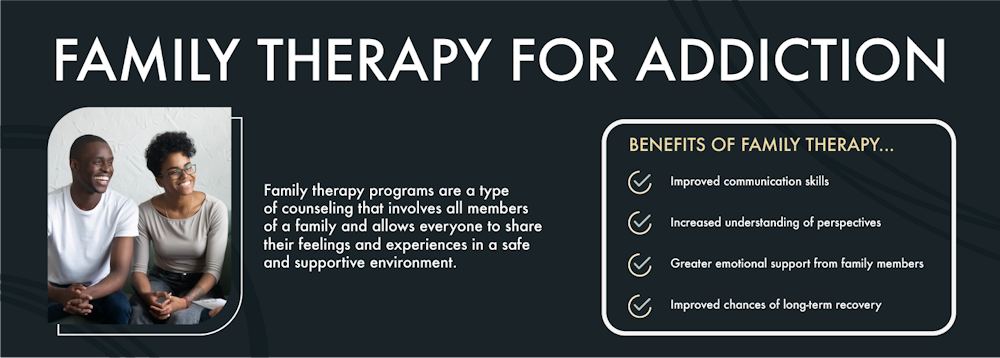FAMILY THERAPY FOR ADDICTION IN HOUSTON, TEXAS
If you’re struggling with substance abuse, you may feel like you’re fighting a losing battle. But you don’t have to go through this alone. Family therapy can be an essential part of your recovery, providing support and guidance from those who care about you the most.
Family therapy for addiction can help with the following:
- Identifying and addressing underlying issues that may be contributing to your addiction
- Strengthening communication and relationships within your family
- Teaching healthy coping skills and strategies
- Providing support and encouragement during recovery
If you’re ready to take the first step toward recovery, let a qualified family therapist from Luna Recovery help you today. With our help, you can build a foundation for a healthy, sober future.
What is Family Therapy?
Family therapy programs are a type of counseling that involves all members of a family, not just the individual struggling with addiction. The addiction therapy techniques in this counseling approach allow everyone to share their feelings and experiences in a safe and supportive environment. Family therapy can help to improve communication and resolve conflict between family members. It can also provide support and guidance on how to best help the individual struggling with addiction.
If you’re considering family therapy for addiction, it’s important to find a therapist you feel comfortable with. There are many different types of therapy, so it’s important to find one that’s right for you. You may want to consider a cognitive-behavioral approach, which can help to change negative thinking and behavior patterns.

How Do Family Therapy Programs Work?
During family therapy sessions, family members and a family therapist will work together to identify the root causes of addiction and develop a plan for moving forward. Family therapy can help families heal old wounds, learn new coping skills, and build a stronger support system.
This type of counseling offers a private and convenient solution to the effects of addiction on the family system. If you are among the countless families dealing with substance use disorders, family therapy may be able to help.
Goals and Principles of Family Therapy for Substance Abuse
The goals of family therapy are to help family members identify and understand the patterns of behavior that are causing problems in their relationships, and to develop new ways of relating to one another that are more positive and effective.
The principles of family therapy are based on the belief that families are systems, with each member affecting and being affected by the other members. Changes in one part of the system can cause changes in other parts. Therefore, family therapy focuses on changing the family’s patterns of interaction, rather than trying to change individual family members.
Benefits of Family Therapy for Addiction
There are many benefits to family therapy for substance abuse, including the following:
- Resolves family conflict
- Improved communication skills among the entire family
- Increased understanding of each other’s perspectives
- Greater emotional support from family members
- Increased motivation to stay in treatment
- Improved chances of long-term recovery
Those who are closest to an individual have the potential to keep them accountable and on the right track when it comes to sobriety. Without accountability and positive reinforcement/encouragement, it can be extremely difficult for a person to maintain and practice the coping skills they’ve learned in recovery. Even having as little as one person by their side could mean the difference between relapse and continued sobriety.
Types of Family Therapy for Substance Abuse
There are many family therapy models for substance abuse. Each approach has unique benefits and addresses the specific needs of families dealing with drug abuse.
This type of family counseling can help address adult and adolescent substance abuse problems. Family behavior therapy focuses on the behaviors of the struggling individual and how they affect the family members. Additionally, FBT strives to change these behaviors with the help of the whole family unit. This type of therapy can work in tandem with adolescent addiction treatment.
BCT works to help couples who are married or living together. When one partner struggles with substance abuse, the effects on the relationship can be monumental. Behavioral couples therapy encourages abstinence from substance abuse by implementing a daily “Recovery Contract”.
FFT is a helpful therapy for addressing adolescent substance abuse. It focuses on bettering interactions between family members to address unhealthy family dynamics that might be contributing to teen substance abuse. FFT can help with the development of parenting skills, conflict-resolution techniques, and problem-solving methods.
This type of family counseling is also very helpful for families with teens suffering from substance use disorders. Like functional family therapy, BSFT focuses on improving family interactions and addressing unhealthy family dynamics.
Multidimensional family therapy works to improve family functioning by involving a school, legal system, or other parties that are relevant to the situation.
MST can help families of people exhibiting violent behaviors, criminal activity, and other such behavioral issues along with drug or alcohol abuse. This family counseling approach involves techniques that are goal-oriented and strategies that can strengthen the family, resulting in improved family relationships.
When a family member suffers from co-occurring mental health issues and substance use disorders, solution-focused family therapy can be beneficial to both the person and their entire family system. This therapy method doesn’t focus on finding the causes of family problems. It instead strives to find solutions for specific issues within the family.
Individuals struggling with addiction, their parents, and other family members can benefit from educational resources and supportive services as they work through the recovery process. Family peer recovery support services can help with this.
Family support groups provide encouragement and support for the family members of those living with substance use disorder.
This family therapy approach teaches families how to use positive reinforcement techniques and strategies to help their loved one overcome negative behaviors related to drug or alcohol abuse.
These family therapies can make all the difference when it comes to substance use disorder treatment. Family sessions can increase family strengths, improve family communication, and ensure positive treatment outcomes.
What to Consider When Looking for Family Therapy Options
If you’re considering family addiction counseling it’s important to find a treatment facility that feels right for you and your family. Here are a few things to keep in mind when searching for the perfect family therapy center:
- Location: You’ll want to choose a family therapy center that’s conveniently located. Consider both the distance from your home and the distance from your work.
- Schedule: Attend family therapy that offers flexible scheduling options. This will allow you to easily fit family addiction counseling into your busy family life.
- Cost: Family therapy can be expensive, so be sure to find a center that fits within your budget. Many insurance plans cover family therapy, so check with your provider to see if your treatments will be covered.
- Reviews: Read reviews of family programs in your area to get an idea of what others have experienced. This can help you narrow down your choices and find the perfect family therapy program for your family.
Finding a facility that is accommodating to those needs is imperative to the recovery process. It could mean the difference between successful recovery and relapse.

How Luna Recovery Can Help Your Family
Luna Recovery provides counseling and substance abuse treatment in Texas to those who are suffering from substance use problems. If you are seeking addiction treatment services for a struggling family member, our treatment practices can help! But, in addition to assisting your loved one in their recovery, we can also provide support for your family throughout the addiction treatment process.
Addiction truly is a family disease; when one person is hurting, it impacts everyone else in the family, too. This is why, as a trusted and proven treatment provider, Luna Recovery offers family interventions and allows family involvement in our addiction rehab approaches. We facilitate healing for the entire family unit by providing family counseling services.
In addition to family therapy models, we also offer individual therapy, group therapy, and neurofeedback therapy. We treat drug addiction and alcoholism while also offering mental health services for those with co-occurring disorders. You can also explore additional treatment options we offer, including outpatient and residential treatment.
If you are interested in finding out more, contact Luna Recovery. We are ready and willing to help those who suffer from substance use disorders in addition to helping their families. Healing is only a phone call away! Reach out to our team to learn more about our substance abuse treatment program and how we can help your family find hope and freedom today.
Dr. Allaire received his Bachelors of Science in Biology from the University of Houston, as Valedictorian of the College of Natural Sciences and Mathematics, and his Medical Doctorate from Baylor College of Medicine, where he served as Chief Resident. He is the medical monitor for the Physician Counseling Committee of the Harris County Medical Society and the Medical Director of Serenity House Detox. Dr. Allaire specializes in medically assisted detox cases, treating patients in recovery from addiction or other mental health disorders, the medical assessment and monitoring of patients with addictive disorders, medical care related to eating disorders and the medical treatment of patients with mental health conditions.




